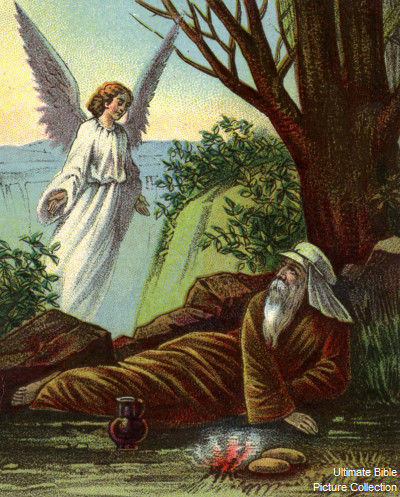We can ask ourself: “Who was this angel?” Because God works through people, and when people do good things and they come in like to save you from some embarrassment or unhappiness or that, if you are a believer, you always say what? You say, “An angel sent you.” This is a very important part of the story of Elijah, who preaches through his stories and not just what he says but what he does because this is the way God works among us. He sends us angels. Who are your angels or are you an angel? They might be close friends; they might be someone you just ran into. But when you reach those desolate times of your life, you will always remember that, You will find someone to help you. God helps us through someone always.
God invites us to be his messangers or Angels. The Lord invites us come to him and to feed on his presence, and in particular to feed on his word. In the Jewish Scriptures bread is often a symbol of the word of God. We may be familiar with the quotation from the Jewish Scriptures, ‘we do not live on bread alone but on every word that comes from the mouth of God.’ We need physical bread, but we also need the spiritual bread of God’s word. We come to Jesus to be nourished by his word. The Father draws us to his Son to be fed by his word. The food of his word will sustain us on our journey through life, just as, in the first reading, the baked scones sustained Elijah, until he reached his destination, the mountain of God. When we keep coming to Jesus and feeding on his word, that word will shape our lives.
"ಆದರೆ ಕರ್ತನ ದೂತನು
ಎರಡನೆಯ ಬಾರಿ ಹಿಂತಿರುಗಿ ಬಂದೆ.
ಅವನನ್ನು ಸ್ಪರ್ಶಿಸಿದೆ, "
"ಈ ದೇವದೂತನು ಯಾರು?" ಎಂದು ನಾವು ನಮ್ಮನ್ನು ಕೇಳಿಕೊಳ್ಳಬಹುದು. ಏಕೆಂದರೆ ದೇವರು ಜನರ ಮೂಲಕ ಕೆಲಸ ಮಾಡುತ್ತಾನೆ, ಮತ್ತು ಜನರು ಒಳ್ಳೆಯ ಕೆಲಸಗಳನ್ನು ಮಾಡಿದಾಗ ಮತ್ತು ಅವರು ನಿಮ್ಮನ್ನು ಕೆಲವು ಮುಜುಗರ ಅಥವಾ ದುಃಖದಿಂದ ರಕ್ಷಿಸಲು ಬಂದಾಗ ಅಥವಾ ನೀವು ನಂಬಿಕೆಯುಳ್ಳವರಾಗಿದ್ದರೆ, ನೀವು ಯಾವಾಗಲೂ ಏನು ಹೇಳುತ್ತೀರಿ? "ಒಬ್ಬ ದೇವದೂತನು ನಿನ್ನನ್ನು ಕಳುಹಿಸಿದನು" ಎಂದು ನೀವು ಹೇಳುತ್ತೀರಿ.ಇದು ಎಲೀಯನ ಕಥೆಯ ಒಂದು ಪ್ರಮುಖ ಭಾಗವಾಗಿದೆ, ಅವನು ತನ್ನ ಕಥೆಗಳ ಮೂಲಕ ಸಾರುತ್ತಾನೆ ಮತ್ತು ಅವನು ಏನು ಹೇಳುತ್ತಾನೆ ಎಂಬುದನ್ನು ಮಾತ್ರವಲ್ಲ, ಅವನು ಏನು ಮಾಡುತ್ತಾನೆ ಏಕೆಂದರೆ ದೇವರು ನಮ್ಮ ನಡುವೆ ಕೆಲಸ ಮಾಡುವ ರೀತಿ ಇದು. ಅವನು ನಮಗೆ ದೇವದೂತರನ್ನು ಕಳುಹಿಸುತ್ತಾನೆ. ನಿಮ್ಮ ದೇವದೂತರು ಯಾರು ಅಥವಾ ನೀವು ದೇವದೂತರೇ? ಅವರು ಆಪ್ತ ಸ್ನೇಹಿತರಾಗಿರಬಹುದು; ಅವರು ನೀವು ಈಗಷ್ಟೇ ಭೇಟಿಯಾದ ವ್ಯಕ್ತಿಯಾಗಿರಬಹುದು. ಆದರೆ ನಿಮ್ಮ ಜೀವನದ ಆ ನಿರ್ಜನ ಸಮಯವನ್ನು ನೀವು ತಲುಪಿದಾಗ, ನಿಮಗೆ ಸಹಾಯ ಮಾಡಲು ಯಾರಾದರೂ ಸಿಗುತ್ತಾರೆ ಎಂದು ನೀವು ಯಾವಾಗಲೂ ನೆನಪಿಸಿಕೊಳ್ಳುತ್ತೀರಿ. ದೇವರು ಯಾವಾಗಲೂ ಒಬ್ಬರ ಮೂಲಕ ನಮಗೆ ಸಹಾಯ ಮಾಡುತ್ತಾನೆ.
ದೇವರು ನಮ್ಮನ್ನು ತನ್ನ ಸಂದೇಶವಾಹಕರಾಗಲು ಅಥವಾ ದೇವದೂತರಾಗಲು ಆಮಂತ್ರಿಸುತ್ತಾನೆ. ಕರ್ತನು ನಮ್ಮನ್ನು ತನ್ನ ಬಳಿಗೆ ಬರುವಂತೆ ಮತ್ತು ಆತನ ಉಪಸ್ಥಿತಿಯನ್ನು ಪೋಷಿಸಲು ಮತ್ತು ನಿರ್ದಿಷ್ಟವಾಗಿ ತನ್ನ ವಾಕ್ಯವನ್ನು ಪೋಷಿಸಲು ಆಮಂತ್ರಿಸುತ್ತಾನೆ. ಯೆಹೂದಿ ಶಾಸ್ತ್ರವಚನಗಳಲ್ಲಿ ರೊಟ್ಟಿಯು ಅನೇಕವೇಳೆ ದೇವರ ವಾಕ್ಯದ ಸಂಕೇತವಾಗಿದೆ. ಯೆಹೂದಿ ಶಾಸ್ತ್ರವಚನಗಳ ಉಲ್ಲೇಖವು ನಮಗೆ ಪರಿಚಿತವಾಗಿರಬಹುದು, 'ನಾವು ರೊಟ್ಟಿಯಿಂದ ಮಾತ್ರ ಜೀವಿಸುವುದಿಲ್ಲ, ಆದರೆ ದೇವರ ಬಾಯಿಂದ ಬರುವ ಪ್ರತಿಯೊಂದು ಮಾತಿನಿಂದಲೂ ಜೀವಿಸುತ್ತೇವೆ.' ನಮಗೆ ಭೌತಿಕ ರೊಟ್ಟಿಯ ಅಗತ್ಯವಿದೆ, ಆದರೆ ನಮಗೆ ದೇವರ ವಾಕ್ಯದ ಆತ್ಮಿಕ ರೊಟ್ಟಿಯೂ ಬೇಕು. ಆತನ ವಾಕ್ಯದಿಂದ ಪೋಷಿಸಲ್ಪಡಲಿಕ್ಕಾಗಿ ನಾವು ಯೇಸುವಿನ ಬಳಿಗೆ ಬರುತ್ತೇವೆ. ತಂದೆಯು ತನ್ನ ವಾಕ್ಯದಿಂದ ಪೋಷಿಸಲ್ಪಡಲಿಕ್ಕಾಗಿ ನಮ್ಮನ್ನು ತನ್ನ ಮಗನ ಬಳಿಗೆ ಸೆಳೆಯುತ್ತಾನೆ. ಎಲೀಯನು ತನ್ನ ಗಮ್ಯಸ್ಥಾನವಾದ ದೇವರ ಪರ್ವತವನ್ನು ತಲುಪುವವರೆಗೂ, ಮೊದಲ ಓದುವಿಕೆಯಲ್ಲಿ, ಬೇಯಿಸಿದ ಸ್ಕೋನ್ ಗಳು ಅವನನ್ನು ಪೋಷಿಸಿದಂತೆಯೇ, ಆತನ ವಾಕ್ಯದ ಆಹಾರವು ನಮ್ಮ ಜೀವನದ ಪ್ರಯಾಣದಲ್ಲಿ ನಮ್ಮನ್ನು ಪೋಷಿಸುತ್ತದೆ. ನಾವು ಯೇಸುವಿನ ಬಳಿಗೆ ಬಂದು ಆತನ ವಾಕ್ಯವನ್ನು ತಿನ್ನುತ್ತಾ ಇರುವಾಗ, ಆ ವಾಕ್ಯವು ನಮ್ಮ ಜೀವನವನ್ನು ರೂಪಿಸುತ್ತದೆ.
"ma l'angelo dell'Eterno
è tornato una seconda volta,
lo ha toccato",
I Re 19:4-8; Efesini 4:30–5:2; Gv 6,41-51
Una volta Elia cercò riparo e riposo sotto una ginestra. Dopo aver appreso che Gezabele intendeva ucciderlo per vendicare la morte dei profeti di Baal sul Monte Carmelo, Elia fuggì nel deserto per salvarsi la vita (1 Re 19:1-3). Lontano nel deserto, giunse a una ginestra, si sedette all'ombra del roveto e pregò per la sua morte: "'Ne ho abbastanza, SIGNORE', disse. ' Prendi la mia vita; Io non sono migliore dei miei padri'" (1 Re 19:4). Dio permise a Elia di riposare sotto la ginestra, dandogli la forza di cui aveva bisogno prima di continuare il suo viaggio verso il monte Horeb (1 Re 19:8-9). E così era corso giù dal nord di Israele e ora era in mezzo al deserto. E fu allora che disse: "Ne ho abbastanza", e si addormentò. E quando si svegliò, c'era un pasto per lui. La Bibbia dice che è stato dato da un angelo. Significa dato da un messaggero di Dio.
Possiamo chiederci: "Chi
era questo angelo?" Perché Dio opera attraverso le persone, e
quando le persone fanno cose buone e intervengono, come per salvarti da un
certo imbarazzo o infelicità o che, se sei un credente, cosa dici sempre?
Voi dite: "Un angelo ti ha mandato". Questa è una parte molto
importante della storia di Elia, che predica attraverso le sue storie e non
solo ciò che dice, ma ciò che fa, perché questo è il modo in cui Dio opera tra
noi. Ci manda degli angeli. Chi sono i tuoi angeli o tu sei un
angelo? Potrebbero essere amici intimi, potrebbero essere qualcuno che
hai appena incontrato. Ma quando arriverai a quei momenti desolati della tua
vita, ricorderai sempre che troverai qualcuno che ti aiuterà. Dio ci aiuta
sempre attraverso qualcuno.
Dio ci invita ad essere i suoi
messaggeri o Angeli. Il Signore ci invita a venire a Lui e a
nutrirci della sua presenza, e in particolare a nutrirci della sua
Parola. Nelle Scritture ebraiche il pane è spesso un simbolo della
parola di Dio. Forse conosciamo la citazione delle Scritture ebraiche:
'Non viviamo di solo pane, ma di ogni parola che esce dalla bocca di Dio'.
Abbiamo bisogno di pane fisico, ma abbiamo anche bisogno del pane
spirituale della parola di Dio. Veniamo a Gesù per essere nutriti dalla sua
parola. Il Padre ci attira a suo Figlio per essere nutriti dalla sua
parola. Il cibo della sua parola ci sosterrà nel nostro cammino nella
vita, proprio come, nella prima lettura, le focaccine cotte al forno hanno
sostenuto Elia, fino a raggiungere la sua destinazione, il monte di Dio. Quando
continuiamo ad andare a Gesù e a nutrirci della sua parola, quella parola
modellerà la nostra vita.




No comments:
Post a Comment